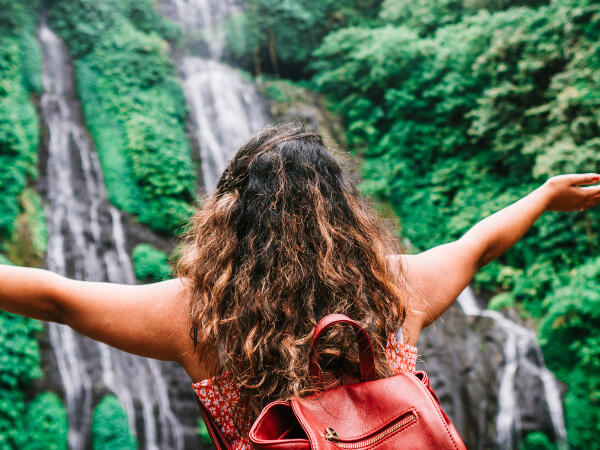Traveling is one of the most rewarding experiences a person can have. It allows us to step out of our comfort zones, explore new cultures, and make memories that will last a lifetime. Whether you’re planning a weekend getaway or a long-term trip, there are a few things to keep in mind to ensure that your journey is as enjoyable and stress-free as possible.
1. Be Flexible and Open to New Experiences
Photo byCanva
When traveling, it is important to be both flexible and prepared. Be flexible and open to new experiences, but also have a plan in case things go wrong. For example, make sure to research the best places to stay, the best restaurants to try, and the best attractions to visit.
It is also important to have a backup plan in case your first choice doesn’t work out. Additionally, having a plan for if your flight is delayed, or an emergency arises, can help keep your peace of mind while traveling.
Though it might seem like extra work, having a plan can help ensure that your trip is enjoyable and stress-free.
- Research your destination, including the weather, local customs, and any events or festivals that may be happening during your trip.
- Make a rough itinerary, including the sights you want to see and the activities you want to do. This will help you make the most of your time and avoid feeling rushed or stressed.
- Look into transportation options, such as trains, buses, and taxis, and plan how you will get around.
- Research the best places to eat and drink, and make reservations if necessary.
- Make sure your passport and visa are up-to-date and have all the necessary documents for travel.
- Research your accommodation options and book in advance to ensure availability and get the best rates.
- Look into any necessary vaccinations or health precautions that you should take before your trip.
- Look into travel insurance and consider purchasing a policy to protect yourself and your belongings in case of unexpected events.
2. Pack Light to Avoid Unnecessary Baggage Fees

Packing light is one of the best ways to avoid unnecessary baggage fees when traveling. Here are a few tips to help you pack light:
- Make a packing list and stick to it. This will help you avoid packing unnecessary items.
- Choose versatile clothing that can be worn in different combinations. This will help you reduce the number of items you need to bring.
- Pack multi-purpose items such as a scarf or sarong that can be used as a wrap, a blanket, or a beach cover-up.
- Wear your heaviest shoes and coat on the plane to save space in your luggage.
- Use packing cubes or compression bags to maximize space and keep your clothes organized.
- Pack travel-sized toiletries and consider using refillable containers to save space.
- Avoid packing items that can be easily purchased at your destination, such as shampoo or sunscreen.
- Avoid checking in a bag if possible; consider a carry-on or personal item to avoid bag fees.
3. Keep Important Documents in A Safe and Accessible Place

Keeping important documents, such as your passport, in a safe and accessible place is crucial when traveling. Here are a few tips to help you keep your documents safe:
- Make copies of all important documents, such as your passport and travel insurance, and keep them in a separate location from the originals.
- Use a waterproof and fire-proof safe or a hotel safe to store your documents when you’re not using them.
- Use a money belt or hidden pouch to keep your passport and other important documents close to your body and out of sight.
- Keep a digital copy of your passport and other important documents on your phone or in a cloud-based storage service, in case you lose the physical copies.
- Be aware of pickpocketing and other forms of theft, especially in crowded tourist areas.
- Keep your passport and other important documents separate in case one is lost or stolen.
- Consider a RFID-blocking wallet or passport holder to prevent identity theft.
4. Use A VPN

Using a VPN (Virtual Private Network) to protect your personal information when traveling is becoming increasingly important.
A VPN is a secure network that helps to protect your data from being accessed by unwanted third parties when you are connected to public Wi-Fi networks. This means that all your data, including passwords, emails, and financial information, will be kept safe from hackers trying to intercept your data. It also helps to protect your online activity from being tracked, allowing you to browse the web anonymously.
With the increasing use of public Wi-Fi networks, it’s important to make sure your personal information is secure. Investing in a VPN is a great way to ensure that your data is protected when you are out and about.
5. Be Mindful of Local Customs

Being mindful of local customs and etiquette is crucial to avoid offending anyone when traveling to a new place. Here are a few tips to help you be respectful of local customs:
- Research the culture and customs of your destination before you go. This will give you an idea of what to expect and help you prepare for your trip.
- Dress modestly and appropriately, especially when visiting religious sites or homes.
- Learn a few basic phrases in the local language, such as “please” and “thank you”, which can help convey respect and politeness.
- Learn about local customs surrounding food, such as whether it’s appropriate to use your left hand, or if there are any restrictions on eating certain foods.
- Be respectful of local customs surrounding physical contact, such as avoiding public displays of affection or not touching someone’s head.
- Learn about local customs surrounding gift-giving, such as whether or not it’s appropriate to give or receive gifts.
- Be respectful of local customs surrounding time, such as punctuality.
- Be open-minded and try to understand the reasons behind different customs, even if they seem strange or unfamiliar to you.
6. Learn Phrases in the Local Language

Learning a few basic phrases in the local language is always a good idea if you are traveling to a new country. Having a few key phrases under your belt can help you communicate better with the locals and make your travels smoother and more enjoyable.
Even if you don’t become fluent in the language, the locals will appreciate your efforts in trying to communicate in their language.
Start with some basic phrases such as “hello”, “thank you”, “where is the bathroom?”, and “I don’t understand”. As you get comfortable with the language, you can add more phrases and even start to have conversations with the locals.
7. Take Time to Relax and Enjoy

Finally, be sure to take time to relax and enjoy the journey. Traveling can be tiring and stressful, but it’s important to take a step back and appreciate the beauty of your surroundings. Whether it’s a picturesque sunset or a delicious meal, make sure to take the time to savor the moment.
Whether you are traveling by car, train, or plane, taking the time to appreciate what you are experiencing is essential. It can be an opportunity to learn something new, reconnect with yourself, and even explore a new culture.
Get Out There and Travel
Traveling is an amazing opportunity to learn, grow, and create memories that will last a lifetime. With a little bit of planning and an open mind, you can make the most of your journey and come home with a wealth of new experiences and perspectives.













